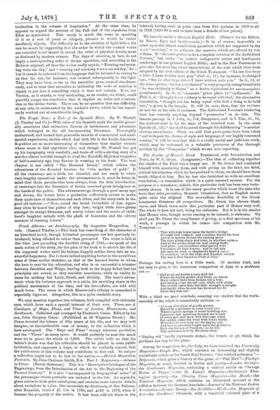The Similes of Homer's Iliad. Translated, with Introduction and Notes,
by W. C. Green. (Longmans.)—The idea of collecting together the similes of the Iliad was a happy one. If Mr. Green had contented himself with annotating them, and with giving us the brief, too brief, critical introduction which he has prefixed to them, we should have been much obliged to him. Ent he has also furnished us with an excellent translation,—a translation which is a quite unusual success. For the purpose of a translator, indeed, this particular task has been very fortu- nately chosen. It is one of the many puzzles which beset the man who faces that duke periculum, Homeric translation, that no English metre quite suits the original. The marvellous flexibility of the Greek hexameter distances all competitors. Mr. Green has chosen blank verse, and blank verse suits this particular part of Homer very well. The whole it does not suit, being too elaborate. But it is in his similes that Homer also, though never ceasing to be natural, is elaborate. We shall pay Mr. Green the compliment of giving, as a first specimen of his work, a passage in which he comes into comparison with Mr. Tennyson :— " Thus with high hopes upon the battle's bridge All night they camped: and countless blazed the tires. And as in heaven around the shining moon The stars gleam sharp and clear, in windless calm,— And all the peaks stand out, and jutting bluffs, And glens: and boundless ether parted wide Uncurtains all high heaven : and in full tale Are seen the stars. to shepherd's heart a joy,— So countless, Iwixt the ships and Xanthus stream The watch-fires blazed In front of Ilion."
Perhaps the ending here is a little weak. Of another kind, and not easy to give, is the humorous comparison of Ajax to a stubborn
ass
:— "And as an ass beside a corn-field led Forces his boyish guides (dull brute, on whom Stout cudgels have been broken not a few), And halting crops the tall corn, while with sticks The urchins smite him, but their strength is naught; And hardly when he now has browsed his till
.. Drive they him out." . " ..
With a third we must conclude, assuring our readers that the work- manship of the whole is remarkably uniform :—
"As is an olive plant of goodly growth Reared by a gardener in some lonely plot Where copious springs of water bubbling rise. Luxuriant, fair, quivering beneath the breath Of every gale, and thick with blossoms white. But sudden comes the wind with heavy storm, Wrenches Its root from out the gaping soli, And lays its prostrate length upon the ground,— Such was the son of Panthus,—so he fell, That spearman stout by Menelails slain."
"Gaping soil "hardly represents $coOpds, the trench or pit which the gardener has dug for the plant.


































 Previous page
Previous page